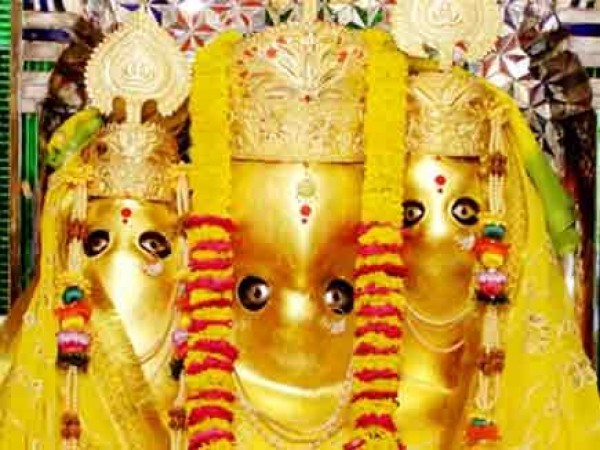
Datia, Madhya Pradesh, is a land steeped in spirituality and mysticism, and at its heart lies the revered shrine of Maa Pitambara Devi. This sacred abode has been a center of faith, devotion, and cultural heritage for centuries. In this article, we will take a journey into the mystical world of Maa Pitambara Devi, exploring the legends, rituals, and significance that make this temple an essential pilgrimage site.
Maa Pitambara Devi, also known as Goddess Baglamukhi, is a manifestation of Shakti, the divine feminine energy. She is worshipped for her power to protect and defeat negative forces. The name 'Pitambara' refers to the yellow attire she adorns, symbolizing valor and courage.
Every temple has a story, and Maa Pitambara Devi's abode is no different. It is said that when a demon named Madan dared to disturb the meditating Lord Vishnu, Maa Pitambara Devi emerged to rescue the world from his tyranny. Her fierce form and divine intervention subdued the demon, restoring peace and harmony.
The temple of Maa Pitambara Devi in Datia is a marvel of architecture and spirituality. With its stunning yellow facade, it captivates devotees and tourists alike. The temple's intricate artwork and design leave a lasting impression, making it a must-visit for art and architecture enthusiasts.
The temple of Maa Pitambara Devi holds immense spiritual significance, drawing devotees from across India and beyond. Here are some aspects that make it a spiritually enriching destination:
The temple is renowned for its tantric worship practices. Tantric rituals are an integral part of the worship, where devotees seek divine blessings for protection, victory over enemies, and spiritual growth.
Navratri, the nine nights of devotion, is a grand celebration at the temple. The whole town comes alive with colorful decorations, processions, and cultural performances. It's a time when devotees immerse themselves in devotion to Maa Pitambara Devi.
Maa Pitambara Devi is believed to possess healing powers. Devotees with ailments and troubles come seeking her blessings, hoping for a miraculous cure. The temple's serene ambiance adds to the healing experience.
Visiting the temple is not just a physical journey; it's a spiritual one. The devotees' journey involves several rituals and offerings, including:
Devotees offer yellow clothes to the goddess as a symbol of their devotion and faith in her protective powers.
Lighting lamps with mustard oil is a common practice at the temple. It signifies dispelling darkness and seeking the light of wisdom.
Chanting mantras dedicated to Maa Pitambara Devi is an essential part of the worship. It invokes her blessings and protection.
Datia's cultural heritage is deeply intertwined with the worship of Maa Pitambara Devi. The temple is not just a religious site but also a center of art, music, and traditions that have been passed down through generations.
During festivals and special occasions, the temple premises come alive with folk dances and music. It's a vibrant expression of the local culture.
Visitors can explore a range of handicrafts and souvenirs in the nearby markets, showcasing the local craftsmanship and artistic traditions.
Maa Pitambara Devi in Datia, Madhya Pradesh, stands as a testament to the rich tapestry of Indian spirituality and culture. It's not just a temple; it's a sanctuary of faith, hope, and divine grace. The legends, rituals, and vibrant celebrations make it a place where the material and spiritual worlds converge. So, if you're seeking a spiritual journey that combines history, art, and devotion, make sure to include Maa Pitambara Devi's temple in Datia on your itinerary. It's a place where the divine resides, and where hearts find solace.
Jugaadya Madhava Temple is one of the 52 Shaktipeeths
If you are thinking of going trekking then these are the best treks of India...book today only
Railway Extends Special Train Services on These Routes, Check Details Here